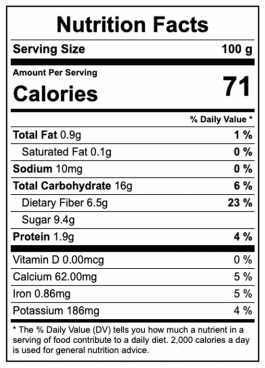
Delicious fresh kumquats
Kumquats are mostly water and delightful flavor. They’re a great source of soluble fiber—serving up almost 7 grams in just a few ounces, and an excellent addition to any weight-loss plan. They’re a virtual guilt-free snack with very little sugar and lots of vitamins A and C. And kumquats are unlikely to cause a spike in blood sugar levels, and even contribute to better cholesterol levels.
Here is the nutrition information for 100 grams (about 4 ounces) of kumquats:

The main plant compounds in kumquats are:
- Beta-carotene. You can tell a fruit has beta-carotene by its color: if you’re seeing a lot of orange, you know beta-carotene is there. This carotenoid, or plant compound, changes to vitamin A in the body, contributing to better eye health.
- Hesperidin. Hesperidin is a healing plant compound that reduces cholesterol production and relaxes your arteries—and researchers say that can lower your blood pressure by up to six points.
- Leutein and Zeaxanthin. Researchers believe these carotenoids may help treat dry eyes, a condition that strikes many people during dry winter months.
- Vitamin A. Vitamin A is an antioxidant that protects your cells from the onslaught of free radicals—those molecules in your body that could open the door to heart disease, cancer, and other ailments.
- Vitamin C. Since your body doesn’t make vitamin C naturally, you have to get it (ideally) from food. Vitamin C is important for healthy blood vessels—the nutrient superhighway of your body. It also supports the health of cartilage and muscles, as well as collagen—a protein necessary for good bone health. And vitamin C plays a key role in healing.
- Fiber. Kumquats contain what’s called soluble fiber, which dissolves in water. And soluble fiber can help lower your blood sugar and your cholesterol.
Did you know all these nutrition facts about kumquats? Please tell us what you think.


 Previous
Previous

